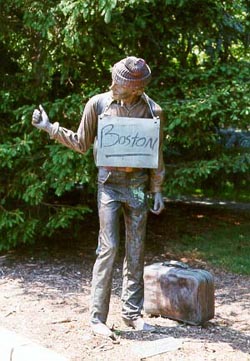This Agreement (“the Agreement”) sets forth the obligations of any party (“party” or “parties”) choosing to sign below.
WHEREAS parties desire to lessen their environmental footprints and live more sustainably,
WHEREAS parties recognize that current consumption patterns are not in the interest of sustainability and diminish the ability of the planet to provide for other people, other creatures, and future generations of both,
WHEREAS parties wish to conserve both financial and natural resources,
WHEREAS parties recognize that labor conditions and environmental standards in developing nations are not always respectful of human rights and human health,
Parties hereby agree to the following:
1. Material Goods:
(a) Parties agree to refrain from the purchase of material goods.
(b) Categorical exclusions:
i. business expenses, as defined in 26 U.S.C. 162(a).
ii. pet supplies, limited to pet food and cat litter, and UV bulbs for the turtle,
iii. goods purchased for safety reasons,
iv. gasoline and fuel,
v. gifts for people who are not a party to this agreement,
vi. goods related to alleviating a medical condition,
vii. toiletries related to hygiene(i.e. not cosmetic),
viii. items related to not increasing the population of our delicate planet,
ix. items purchased to sanitize and/or clean- detergents, sponges, brushes, etc.
2. Food and Entertainment:
(a) Michelle will limit her purchase of food prepared at a restaurant to one breakfast (starting before 11:00am) OR lunch (starting between 11:00am and 3:00pm), and one dinner (starting after 3:00pm) per week.
(b) Parties will not eat at any restaurant which has locations outside of the state in which they are physically located.
(c) Parties will refrain from seeing movies at a movie theater, but video rentals are allowed.
(d) Parties may participate in (b) or (c) above if invited by a non-party and changing non-party’s plans would inconvenience others.
3. Groceries:
(a) Parties are limited to 1 (one) grocery trip per week by fossil-fuel transportation. Grocery trips by foot or bike are not limited.
(b) Parties may only purchase items grown and made in the United States of America.
(c) Parties may only purchase items from a grocery list written down prior to the grocery trip.
4. Replacing broken/worn goods: Parties may only replace the following items:
(a) computers,
(b) hand blender,
(c) lighting fixtures,
(d) toaster oven,
(e) cell phones,
(f) watches,
(g) cars.
5. Transportation: Parties agree not to use a car for trips less than 2 miles (as determined by Google Maps), excluding:
(a) trips to transport cargo that cannot be carried by hand,
(b) trips during inclement weather ONLY when items are being transported and cannot get wet,
(c) medical emergencies,
(d) moving the car on street cleaning nights.
6. Travel/Vacations:
(a) Parties agree to take in consideration environmental impacts when making choices about travel.
(b) Parties agree to incorporate a public service aspect to all vacation travel (i.e. travel not for the purpose of seeing relatives or specific occasions like weddings).
7. Water and fuel usage: Parties will take steps to minimize water and fuel usage, including but not limited to:
(a) Parties will limit showers to 10 minutes.
(b) Parties will set the thermostat at a maximum of 58 during the winter. Parties agree not to get air conditioning as long as they are living in Maine.
(c) Parties will set the hot water heater at a maximum of 110 degrees Fahrenheit.
8. Garbage and Waste: Parties agree to
(a) buy food and toiletries with minimal packaging,
(b) compost food waste,
(c) and recycle any items accepted by the city of Portland.
9. Force Majeure: If parties’ goods are destroyed by natural disaster, fire (not caused by a party committing arson), or any act from a third party, parties may replace destroyed items only. Parties will hopefully not destroy other party’s goods out of spite.
10. This Agreement may be amended by the consent of all parties only.
11. Term of Agreement: These terms are in effect January 1, 2008 through December 31, 2008.
Signed,
Michelle T (electronically signed) 1/1/08
Elliott T (electronically signed) 1/1/08
Amendment 1 (1/1/08): Section 3(b) is amended to read: "(b) Parties may only purchase items grown and made in the United States of America, or failing that, Parties may only purchase items grown and made outside of the US if items are organically grown."

























